PRINCETON, NJ -- Americans who watched the first presidential debate on Sept. 26 gave Barack Obama the edge over John McCain as having done the better job in the debate, by a 46% to 34% margin. These results are based on a special USA Today/Gallup poll conducted on Saturday, Sept. 27, the first day after the debate.
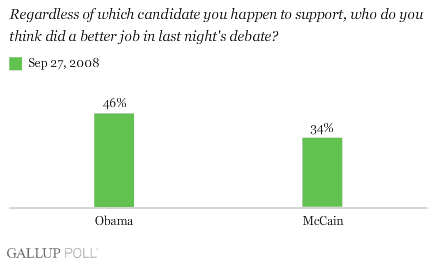
The questions about the debate were asked of a random sample of 1,005 national adults as part of the Gallup Poll Daily tracking program on Saturday. Of the total sample of adults, 63% said they had watched the debate. Of the 37% that did not watch the debate, 12% said that they had seen, heard, or read news coverage of the debate, and the rest said they had neither seen the debate nor news coverage thereof.
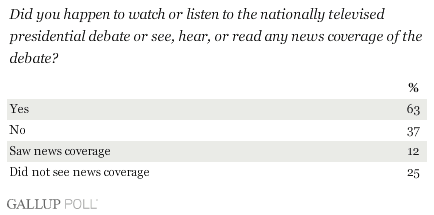
The data show a predictable pattern of response from Republicans and Democrats. Seventy-two percent of the former and 74% of the latter said that their party's candidate did the better job in the debate. This reinforces the conventional wisdom that many viewers watch a debate through their preexisting perceptual framework and end up with nothing more than reinforcement for what they believed before the debate began. But among the crucial group of independents who watched the debate -- those most likely to actually be swayed by what transpired, Obama won by 10 points, 43% to 33%.
Not only did Obama win the debate among debate watchers, they say that their attitudes towards the Democratic candidate also improved as a result. Thirty percent of debate watchers said they came away with a more favorable image of Barack Obama, while just 14% said they had a less favorable image. On the other hand, John McCain did not fare as well. Just as many watchers said that they developed a less favorable image of John McCain -- 21% -- as said they gained a favorable image of McCain as a result of the debate.
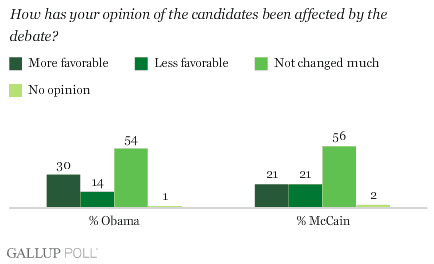
Although the debate was supposed to deal with foreign policy, the first portion of the questions asked by moderator Jim Lehrer focused on the economy and the financial bailout plan being negotiated by Congress. This economic focus appears to have been positive for Obama; debate watchers ended up with more confidence in Obama's ability to deal with the economic problems facing the country, rather than less confidence as a result of the debate. By contrast, 37% of debate watchers said that the debate gave them less confidence in John McCain on economic matters rather than more.
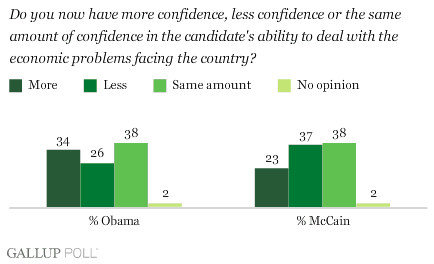
Debate watchers saw little difference between the two candidates on national defense and foreign policy as a result of the debate; both Obama and McCain appeared to have come away with slightly improved images on foreign policy.
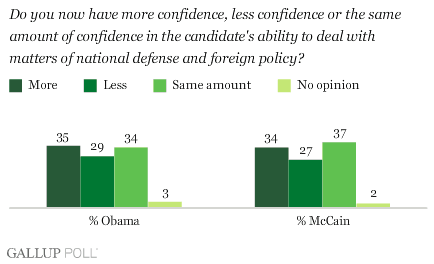
Finally, by a fairly substantial margin, debate watchers said that Obama was the candidate who offered the best proposals for change in the debate, by a 17 percentage point margin over McCain.
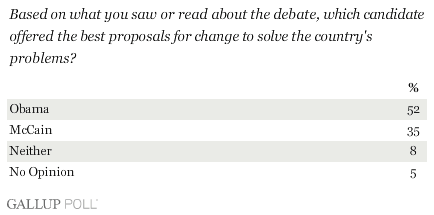
Implications
History shows that "winning" the first presidential debate does not necessarily translate into winning the election. Ross Perot, Al Gore, and John Kerry are among those who were seen by debate watchers in quick reaction polls as having done the better job in the first debate of their campaign year, and all eventually lost their elections. There are two presidential (and one vice presidential) debates yet to come, and much can change. The most important indicator of the impact of the debate may be trends in overall candidate support, where, at the moment, Obama leads McCain.
Survey Methods
Results are based on telephone interviews with 1,005 national adults, aged 18 and older, and 701 people who watched the Sept. 26 presidential debate, conducted Sept. 27, 2008. For results based on the total sample of national adults, one can say with 95% confidence that the maximum margin of sampling error is ±3 percentage points, and for the sample of debate watchers, one can say with 95% confidence that the maximum sampling error is ±4%. .
Interviews are conducted with respondents on land-line telephones (for respondents with a landline telephone) and cellular phones (for respondents who are cell phone only).
In addition to sampling error, question wording and practical difficulties in conducting surveys can introduce error or bias into the findings of public opinion polls. Polls conducted entirely in one day, such as this one, are subject to additional error or bias not found in polls conducted over several days.
To provide feedback or suggestions about how to improve Gallup.com, please e-mail feedback@gallup.com.
